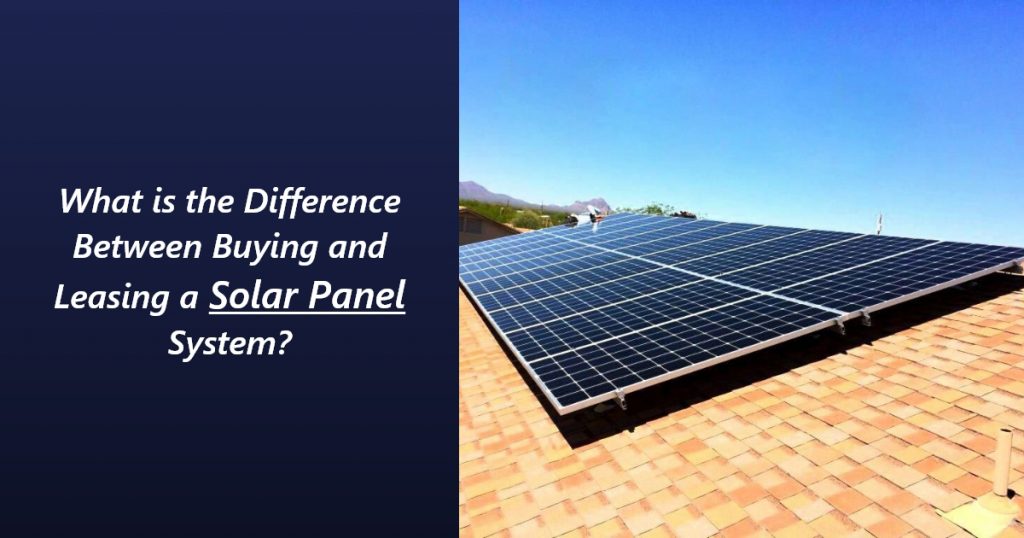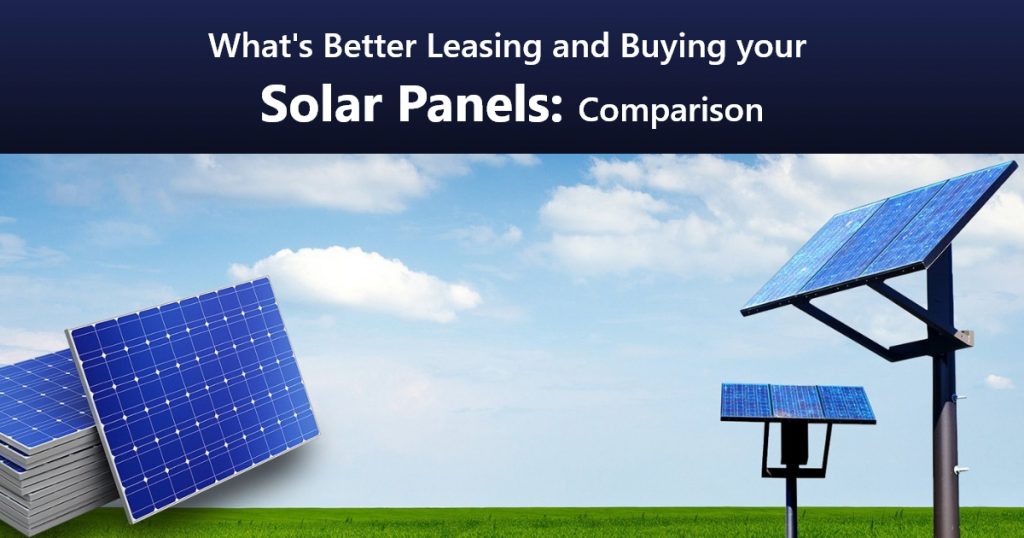Is It Better to Lease or Buy Solar Panels For Home? – You Should Know.
In the United States, solar energy has never been more popular. The expanding number of people working in the solar business, the amount of power generated by solar, the number of rooftop solar panel installations, and other factors all support this argument.
What’s the difference between leasing solar panels and buying them with a loan? You’ve come to the perfect place if you’re trying to figure out which option is best for you to reap the benefits of solar power. Let’s go over the details of buying vs. leasing solar panels.
Also Read: – 7 Important Benefits of Solar Power You Need to Know.
But first,
What is a Solar Lease?
In a nutshell, It’s similar to leasing anything else — a house, a car, or some land — except for rooftop solar panels. You get all of the advantages of using solar energy to power your home without the upfront fees or long-term upkeep. Let us take a closer look:
- Solar panels can be leased for no money up front.
- It is not necessary to pay for the solar panels to be repaired or fixed.
- You believe in using renewable energy sources.
- In most cases, the lease is for 15 to 20 years.
- You have the option of purchasing your panels whenever you choose.
What is the Difference Between Buying and Leasing a Solar Panel System?

The primary distinction between purchasing and leasing a solar system is who owns it. You become the owner of solar panels when you purchase them, whether with cash or through a solar loan.
You don’t have to pay any upfront charges to install solar panels on your roof if you use a solar lease or solar power purchase agreement (solar PPA). Instead, the solar system is installed and owned by a solar firm. With net metering, you get to consume all of the solar energy that your system generates, lowering your utility bill. You pay a monthly lease payment to the solar company in exchange for using solar energy.
What is a Solar Purchase Plan Agreement (PPA)?
In this case, rather than paying for the panels, you’re paying for the electricity generated. This makes it more like signing up for a green energy plan from your local retail power provider, except instead of buying Renewable Energy Credits, you’re actually using solar energy (RECs).
Both of these options entail having a third-party corporation own the panels while you participate in the renewable energy revolution. Leasing is still the best choice for people who want to use solar electricity but don’t want to take on the burden of owning solar panels or don’t have the funds to buy them outright.
What’s Better Leasing and Buying your Solar Panels: Comparison

Solar panels can be purchased or leased, and each has its own set of benefits and drawbacks. Let’s compare and contrast these two funding choices.
- Long-term savings
You will save money on your energy bill whether you lease or buy solar panels. However, if you buy the system outright, you will save a lot of money in the long run. Taking up a solar loan can also save you a lot more money in the long run than leasing solar panels.
When you buy solar panels, you pay for them upfront and don’t have to worry about making monthly payments. A solar lease, on the other hand, binds you to monthly lease payments for 20 years or longer, depending on the period of the lease.
Also Read: – Does Solar Power Really Save Your Electricity Bill?
- Monthly payments
You get a solar lease or PPA when you lease solar panels. Some demand no money down, while others do, and your monthly cost will be determined by this.
Solar loans are normally paid down after a specified number of years, resulting in lower monthly payments, and will eventually be paid off, so the savings may be less.
- Tax credits and incentives
One of the major drawbacks of solar leasing is that you can’t take advantage of some solar panel incentives, such as the federal investment tax credit, which can save you up to 26% on the entire cost of solar panel installation.
This is because, despite the fact that the solar panels are on your roof, you do not own them. Instead, the tax credits and rebates go to the solar installer you’re leasing with, not you. If you buy solar you reap good incentives for Solar in Fresno.
Also Read: – What Solar Subsidies are Available to California House Owners in 2021?
- Selling your home
You do not own solar panels if you lease them. This implies that if you decide to relocate, you’ll need to contact the solar provider to discuss purchasing or transferring the lease to a new owner.
According to statistics, your home will sell more and faster if you take out a solar loan. You may even be able to repay the debt since you will earn a higher price for your house.
- Solar installation and maintenance
Leasing solar panels are suitable for you if you want to take on the least amount of responsibility for the solar panels you have placed. Solar panel owners (usually solar leasing firms or installers) will send out staff for maintenance or if anything needs to be repaired.
This may appear to be a benefit as compared to acquiring your solar panels. You won’t have to worry if you find a solar company that offers service and product warranties for the life of your panels and loan. Solar panels also require extremely little upkeep.
Also Read: – When is the best Time to go for a Solar Panel Installation in Fresno?
Final Thoughts-
This implies that while having solar panels installed on your home is a terrific idea if you plan on moving, you’ll need to consider this while determining whether to lease or buy your system. In this situation, paying cash or taking out a loan to purchase your system may be a wiser investment. Get in touch with Solar Companies in California, for either case – buy and lease.